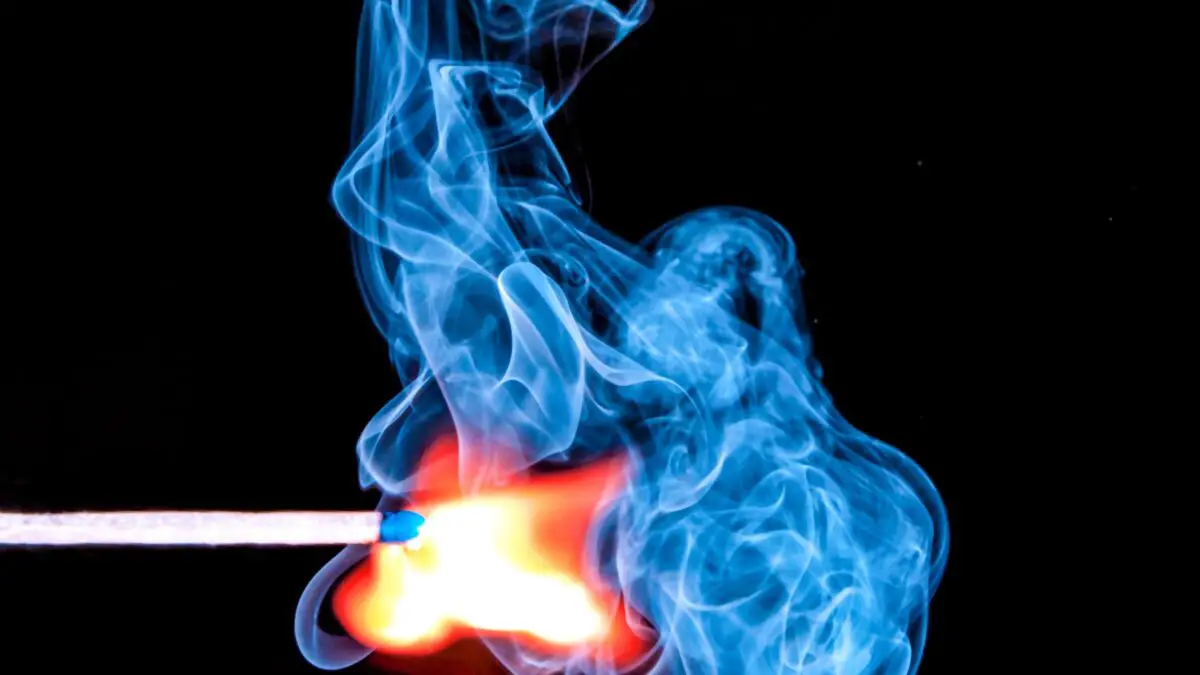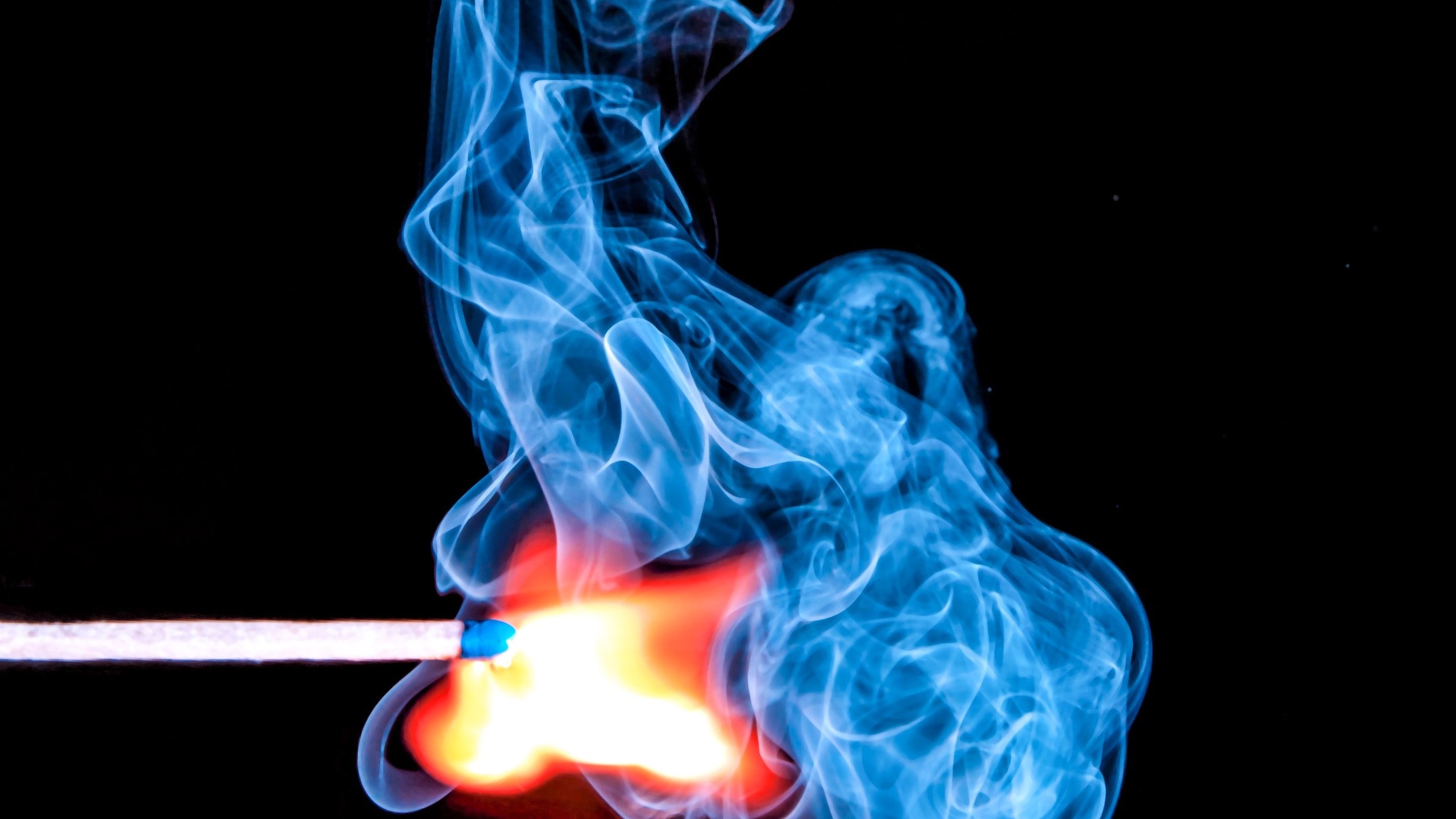Welcome to a smokin’ hot collection of English idioms!
Idioms are expressions that add color and depth to our language, and today we’re diving into the world of smoke idioms. Just like smoke itself, these idioms can be mysterious, evocative, and filled with symbolism.
From phrases that depict confusion and deception to those that capture the intensity of emotions, we’ll explore a variety of idioms that revolve around smoke. We have included a definition and example sentence with each saying on this list, so you can see exactly how to use them.

Smoke idioms
Blow smoke
Let’s start this list of smoke idioms with the phrase to blow smoke. Someone who does this is emitting a figurative cloud of deceptive or insincere words when they speak. In other words, they are lying.
“Don’t be fooled by his promises; he’s just blowing smoke.”
Discover some more idioms about talking here.
Smoke and mirrors
Although this expression may be used to describe magic and tricks, it can be used in other situations too.
When someone talks about smoke and mirrors they are referring to clever tricks or strategies used to create an illusion or deceive others. These tactics are intended to hide what is truly happening.
“The politician’s speech was filled with smoke and mirrors, making it difficult to discern the actual facts.”
Go up in smoke
This is a common idiom about smoke, and one of many idioms to describe things going wrong that we have in English.
We say that something has gone up in smoke if it is completely destroyed or ruined. This could be as if it was burned in a fire, or perhaps just turned into smoke and vanished (another reference to magic tricks).
“All our hard work went up in smoke when the project got cancelled.”
Note that this smoke idiom may be used to describe something that actually did catch fire, although ‘go up in flames’ is more common for this.
Smoking gun
A gun might emit a small amount of smoke after being fired, making it impossible to deny that it has just been used. In the same way, a figurative smoking gun is a piece of indisputable evidence.
“The WhatsApp messages on his phone were the smoking gun needed to make the arrest.”
Smokescreen
Here’s another smoke idiom about deceit and concealing the truth.
In the military, a smokescreen is a dense cloud of smoke used to obscure movements or conceal operations from the enemy.
In a figurative sense, we use this truth idiom to refer to any tactic used to divert attention or hide the truth.
“The company released a vague statement as a smokescreen to conceal their financial troubles.”
“All her questions were clearly a smokescreen; she just didn’t want to answer any herself.”
Smoke like a chimney
Smoking is not good for your health. But if someone smokes like a chimney, it means they smoke a large amount and do so frequently. Much like the continuous stream of smoke from a chimney, in fact.
“My grandfather smoked like a chimney. I never saw him without a cigarette in his hand.”
There are lots of other idioms to describe poor health in situations like this.

Idioms about smoke
No smoke without fire
The saying no smoke without fire suggests that rumors or accusations often have some foundation or truth behind them, just as smoke is usually an indication of a fire.
“There have been several reports of corruption within the company. You know what they say, no smoke without fire.”
“I don’t want to believe the rumors, but there’s no smoke without fire.”
There are plenty of other fire-related idioms in English.
Smoke out
Here’s another smoke expression that can be used in a literal or figurative sense.
To smoke someone/something out can mean to fill a space with smoke to force a person or creature to leave.
“We decided the only way to get rid of the squirrels in the roof was to smoke them out.”
Figuratively, this idiom refers to exposing someone or something; bringing information out into the public eye.
“The detective’s relentless investigation finally managed to smoke out the elusive criminal.”
Smoke signals
Smoke signals are a traditional way of conveying information or transmitting a warning across long distances. In fact, this form of communication has a long line of history.
Today, we use the phrase to refer to a sign that something is likely to happen or going to happen.
“Her subtle gestures were like smoke signals, conveying her true feelings without uttering a word.”
“The smoke signals suggest that we’ll be going ahead with Plan A.”
Smoke-filled room
We’ve said it once and we’ll say it again. Smoking is not good for your health! But in the past, smoking was something that well-to-do businessmen did when they gathered in clubs or offices.
So, a smoke-filled room refers to a location, often imaginary but based on an old-time smoking room, where people make influential decisions behind closed doors. Think of old men smoking cigars!
“The decision to merge the two companies was made in a smoke-filled room, away from public scrutiny.”
Smokin’ hot
You can spell this as smoking hot or smokin’ hot with the ‘g’ missing.
It can mean that something is so hot it’s smoking, but as a hot idiom, it describes someone or something good-looking.
“Don’t touch that grill, it’s smoking hot.”
“That’s a smokin’ hot car you have there!”
After the smoke has cleared
This phrase originates from the aftermath of a conflict, such as a battle, where smoke from gunfire and explosions obscures visibility and makes it challenging to see what has happened.
After the smoke has cleared refers to the time when the chaos or turmoil has subsided from a situation, and things are calmer and easier to assess.
Once the smoke dissipates, it becomes possible to survey the damage, evaluate the situation, and understand the full extent of what has occurred.
“We’ll discuss the consequences of the decision after the smoke has cleared and we can see the actual impact on our business.”
Stick that in your pipe and smoke it
Stick that in your pipe and smoke it is a colloquial idiom about smoke that assertively challenges someone to accept an unpleasant truth or fact, even if they may not like it.
The phrase suggests that the person should take the information or opinion presented, akin to tobacco in a pipe, and “smoke it” or accept it without complaint or resistance.
“I told him the car was beyond repair, but he refused to believe it. So, I showed him the mechanic’s report and said, ‘Stick that in your pipe and smoke it.'”
Holy smoke
Made famous in the old Batman TV series, holy smoke is an exclamation used to express surprise, astonishment, or disbelief. It is a lighthearted phrase often uttered in response to a surprising or unexpected event or piece of information.
“Holy smoke, look at the size of that cake! It’s enormous!”
What are/were you smoking?
We’ll end our list of smoke idioms with this one that should only be used in appropriate situations as a joke.
You can say What are/were you smoking? to show your surprise, confusion, or annoyance at someone’s strange behavior, opinion, or decision. It suggests that they are or were smoking some kind of drugs that clouded their judgment.
“You seriously paid $15,000 for that old wreck? What were you smoking?”
“Do you really think that jacket suits you? What are you smoking?”
“What were you thinking?” is another, less informal way to show your annoyance or displeasure in situations like this.
As we conclude our exploration of smoke idioms, we hope you’ve enjoyed delving into the captivating world of English expressions. Idioms, like tendrils of smoke, add a touch of intrigue and depth to our conversations, making language a truly fascinating art form.
But our journey doesn’t have to end here! If you’d like to receive more language-related content, we invite you to join our mailing list. By subscribing, you’ll become part of a community passionate about the beauty and intricacies of the English language.



